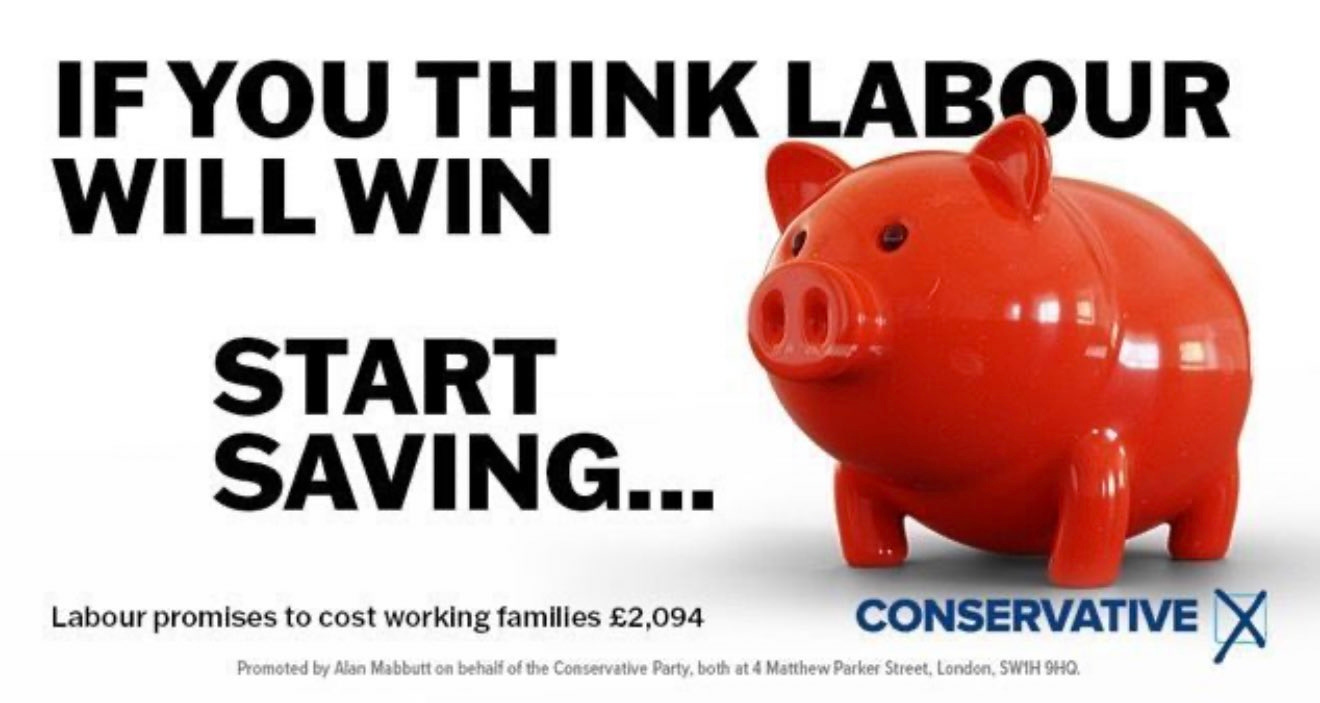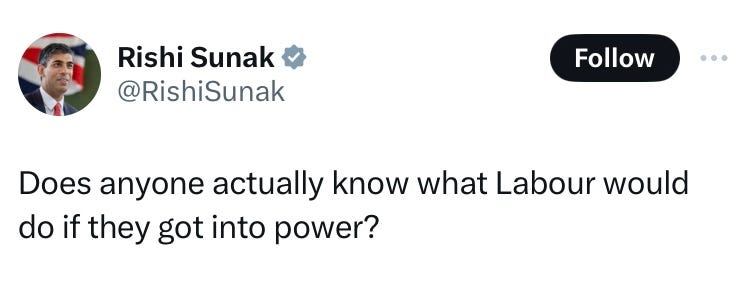Piggy banks
I am not an Independent Financial Adviser, so you should treat what I am about to say with caution and not rely on it. But I have always been led to believe that it is sensible, if you can afford it, to save some of your income rather than spending all of it straight away. Clearly this is easier for some people than others, and there are better and worse places to save your money, and there are times - like when prices are rising faster than incomes and rents and mortgages are especially high - when saving is particularly difficult. But still. If you can save, you should. I reckon. Don’t quote me.
This might be advice you’ve heard before. You might even have heard it from your parents, like I did. You might, when you were little, have had a money box to save cash in, like I did. Perhaps you put your pocket money in it, like I did. Maybe it was shaped like a pig, like mine wasn’t. A piggy bank. The universal symbol of financial prudence. What I’m saying is, “saving is good, you should try to do it” is not a controversial position.
Here’s the latest Conservative Party billboard ad:
That’s a piggy bank, branded in Labour red. The Conservatives have made a choice here to encourage you to associate Labour with saving and with prudence and with wise financial planning, and to convey the idea that under Labour, you will be in a position to “start saving” which, implicitly, you are not doing now for some reason: possibly because your mortgage has gone up.1 It is not obvious to me that this is a brilliantly thought through piece of campaign material.
That’s not the only weird attack choice the Conservatives have made this week. First, they decided to attack Keir Starmer for being old. This an attack that has been moderately successful for Donald Trump against Joe Biden in the United States, but there is an absolutely critical piece of context here, which is that Joe Biden is pretty old. Keir Starmer is 61, which is 20 years younger than Joe Biden. He is a man at the upper end of normal working age, trying to get what is quite a senior job, as jobs go, and it is hard to argue that he looks particularly tired or elderly. Amusingly, 61 turns out to be the average age of that key electoral demographic, people who voted Conservative in 2019 and are now undecided.
The Conservatives have also decided to create a new threat message off the back of one of their new policies, the variously-named “quadruple lock”, “Triple Lock Plus” or “Super Triple Lock”, under which the personal allowance for pensioners would rise in line with the existing “triple lock” so that the state pension will never be taxed, however much it rises. Labour have refused to match this pledge, and the Conservatives have made what must have been the very tempting decision to brand this the “Retirement Tax”. They even made a graphic:
There’s a problem with this. When you make any political attack, you need to work out what its premises are and whether you’re happy to accept them. The Conservatives’ new policy is that if the state pension rises as predicted, the personal allowance will rise too. As it stands, the state pension is below the personal allowance. So as it stands there is no “Retirement Tax”, with or without the Conservatives’ new policy. Labour’s “Retirement Tax” only kicks in if the state pension goes up under Labour. So the underlying Tory message here is “Your state pension will rise under Labour because you can trust their pledge to retain the triple lock”. I’ve heard… scarier threat messages.
Let’s go back to the piggy bank poster, because I skated over an important line on it: the claim that “Labour promise to cost working families £2,094”. This is a suspiciously precise figure, but all parties do this kind of thing: let’s stipulate that it is, strictly speaking, not true - it derives from taking at face value every dubious assumption in the Conservatives’ Labour costings dossier published a couple of weeks ago, and then dividing the total asserted net cost of Labour’s policies (£38.5 billion) by the number of working households in the UK (18.4 million) - and move on. I’m more interested in the bigger problem it raises for Conservative messaging: two problems, in fact.
One can be seen in this LinkedIn post by Rishi Sunak (Rishi Sunak is perhaps the most LinkedIn prime minister in history: a LinkedIn prime minister for a TikTok age):
This is a business-focused message, as you might expect for LinkedIn, but the “every working family” line is a problem. The Tories’ main economic attack relies on assuming that the entire asserted cost of Labour’s plans will fall on taxes on working families specifically. But as businesses are well aware, families are not the only things you can tax. It would be perfectly possible in principle for the Tories to write a threat message to business based on the claim that Labour will increase taxes on business, and to identify some potential candidate tax rises. But they can’t, because they’ve chosen a different path, and claiming that Labour will tax businesses means reducing the £2,094 number for families. It’s a choice, and it makes their business-focused message less potent.
The bigger problem, which I’ve noted before, is that “We have a clear plan, they don’t” is difficult to square with “They have a plan which will cost working families precisely £2,094 each”. The Tories remain deeply conflicted about whether they want to run with “Labour haven’t got a plan” and “Labour have got a plan and here’s the price tag”. And it leads them into unforced errors like this one, from Rishi Sunak on Twitter:
So far in this campaign, the Conservatives have managed to dominate the agenda, admittedly not always to their advantage, because they have made a number of big policy announcements designed to create media coverage. That has undermined the big strategic message that they have a plan - on national service, for example, they very clearly do not - but it has denied Labour the space to have the debate they want to have: on the NHS and the cost of living and, more broadly, on their own policies. Labour do not - or should not - mind the “what would you do?” question, because they have an answer to it that they want to spend the campaign talking about. But they have not had as much opportunity as they would like to answer it, because the debate has been elsewhere.
Rishi Sunak’s tweet asks the question Labour wants to be asked, and here’s the Labour press team jumping on it with a video (this is a screenshot; if you want to watch the video you have to click the link):
One of the golden rules of Prime Minister’s Questions2 is: never ask your opponent a question they want to be asked and can easily answer. That applies to election campaigns too. If the rest of the campaign consists of the Conservatives asking what Labour would do if they won, Labour can live with that. If it consists of the Conservatives telling the public that if Labour wins they will be able - after years of rising prices, rising rents and mortgages and rising bills - to start saving again, Labour can live with that too.
A couple of podcast plugs: this week’s edition of The Election Tricycle, the podcast about the US, Indian and UK elections that I co-present with Emily Tamkin and Rohan Venkat, is mostly (possibly entirely) about the UK and the early stages of the election campaign. At the time of writing this it hasn’t quite gone online, but it will be available at this link, where you can also subscribe to it.
I also appeared on Trendy, a podcast not uncoincidentally co-hosted by my boss, Rachel Wolf, as well as by Professor John Curtis. My colleague Denise Baron - who used to work for the Lib Dems - and I appeared to talk about (again) the early stages of the campaign and what each of the parties are trying to do.
Former Tory minister George Freeman’s mortgage, for example, went up by £1,200 a month, and I wrote about this in January. I’ve had a bunch of new subscribers recently, so I’m going to keep pointing them to old posts they might have missed, like this one. Long-standing subscribers can ignore it, or go and read it again.
Did I mention that I used to work on Prime Minister’s Questions? Buy the book!







Tom, do you think it's sustainable for Labour to apparently have nothing new to announce on policy during the campaign? I get that they want to project consistency and stability and can point back to their missions and first steps - but it seems like it will be really hard for them to make headlines and get coverage if there no rabbits or hats to pull them from. I think they'll find it a long six weeks of getting pulled off course by things like Abbott etc. and getting drawn into responding to Tory announcements.
One wonders if a further problem for tory assertions, claims and pronouncements is that after 14 years of lying and bollocks no one in their right mind will believe a syllable of it